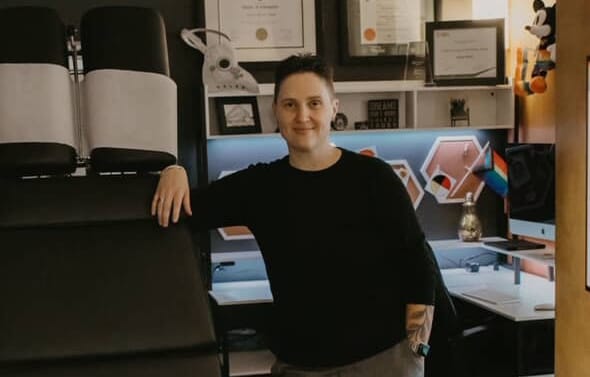Pride in Practice: Dr. Kara Haus on Building Safer Chiropractic Spaces for Queer Patients
When Dr. Kara Haus (she/they) opened a chiropractic practice in Regina, Saskatchewan, she didn’t just want to treat back pain. She wanted to create something that didn’t yet exist in her community for many patients like her: a clinic where queer people could feel safe and access personalized healthcare.
“Lots of times, I’m not even adjusting patients,” she says. “They know me as that queer chiropractor who can help them get on the path they want, whether that’s referrals for hormone therapy, gender-affirming surgery, or just finding a provider who gets it.”


At Healthy Roots Wellness, Dr. Haus offers chiropractic treatments like any other practitioner, but her role goes beyond hands-on care. For trans, non-binary, and queer patients, she acts as a connector and guide to a broader healthcare system that can be challenging to navigate.”
That’s been her vision from the beginning: a practice that is clinically competent and culturally affirming. “I’m open to everyone,” she says. “But my enjoyment in practice comes from treating queer people and queer-adjacent families – just making sure they’re getting the healthcare they require.”


More Than Inclusion—It’s Clinical Competence
When people ask why 2SLGBTQ+ healthcare matters, Dr. Haus doesn’t hesitate. “Why not?” she counters. “We’ve learned to better prioritize pediatric care, women’s health, and people with disabilities – because those populations have specific considerations. Queer patients do too.”
Dr. Haus is not just talking about making people feel welcome as a gesture of kindness. It’s also about safety – both for the patient and healthcare provider.
“[Chiropractors] adjust people [and] to do that safely, we need to understand what’s going on in the body. If we don’t ask the right questions – about gender identity, sex assigned at birth, hormone therapy – we could miss something important.”
Say a 55-year-old woman presents with progressive low back pain, night sweats, and incontinence. “It sounds like menopause,” she says, “but if the patient is a transwoman and no one asked, then the fact that she still has a prostate may be overlooked.” To be clinically competent and thorough in our list of conditions to rule out, we would need to include prostate cancer and possible metastasis to the lumbar spine; this would lead to further diagnostic testing and a referral. This is just one example of the importance of treating each patient individually in order to be comprehensive and clinically prudent.
Two Green Flags That Make a Difference
For queer patients looking for a chiropractor or any primary care provider, Dr. Haus says there are two small but powerful signs that a clinic understands and values your identity:
- Pronouns are included upfront.
When looking for a primary care provider who aligns with your values, this is often the first sign. Seeing pronouns on a website, business card, or email signature shows that a provider acknowledges the importance of gender identity and is taking steps to create an inclusive environment.
“When I see it as a patient, I know instantly: this is someone who understands why that matters,” notes Dr. Haus.
2. Intake forms ask the right questions.
Completing forms that ask about gender identity, sex assigned at birth, and hormone therapy, not just as a gesture of inclusion, but because these details affect care. These questions are relevant for many people, including menopausal women and men with low testosterone. When providers ask, it shows they are thinking both inclusively and clinically. Together, these green flags signal that your healthcare provider sees you and is ready to meet your needs safely and respectfully.
When researching a primary care physician or chiropractor who can tailor your healthcare to your unique needs, look for these small but telling signs. Does the provider demonstrate an understanding of inclusive care? Are they asking the right clinical questions on their intake forms? Do they use language that respects your identity from the first point of contact?
If so, they may demonstrate that your provider is thinking critically and compassionately about who you are, what you’ve experienced, and how your identity may shape your health journey. It’s about more than bedside manner; it’s about building a foundation of trust, respect, and informed care.
Why Affirming Care Matters This Pride (and Every Pride)
At the heart of Pride is the fight for autonomy, dignity, and visibility – and access to gender-affirming care is central to that fight. Chiropractic and other primary care providers can play a meaningful role by understanding the medical realities of hormone therapy, post-surgical care, and the social context queer patients are navigating.
In a political climate where affirming care is increasingly under threat, showing up and showing out for the 2SLGBTQ+ community has never mattered more. Pride isn’t just a celebration—it’s a reminder of the work still to be done.
This year, Pride Month doesn’t feel like a celebration. “Pride means fear,” Dr. Haus reflects. “Especially for the trans and non-binary community.”
While public messaging often leans into belonging, acceptance, Dr. Haus worries that this idealism can obscure the reality for many queer folks. “There’s a meme I’ve seen that says: Less ‘love is love’, more ‘trans people are in danger’ during Pride. And honestly, that hits.”
Even so, Dr. Haus believes in the power of showing up for her patients, for her community, and for the future of healthcare. Creating safer spaces through affirming language, better questions, and informed care is one way to push back.
Image Source: originally posted by @clairewillett on X (formerly Twitter); post no longer available.


Affirming care isn’t a trend or a seasonal gesture during Pride Month. It’s about making sure that everyone feels safe, respected, and supported when accessing healthcare. As part of your primary care team, chiropractors can play a role in supporting the diverse needs of 2SLGBTQ+ patients in their clinics by providing informed, patient-centered care that considers each person’s unique health journey.